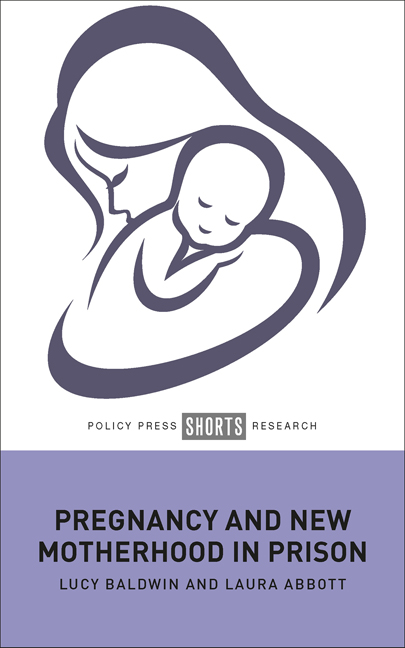Book contents
- Frontmatter
- Dedication
- Contents
- Acknowledgements
- ONE Context and landscape of pregnancy and new motherhood in prison
- TWO How we came to be here: 100 years of criminalised motherhood
- THREE The ‘journey’ to incarcerated motherhood
- FOUR Motherhood confined
- FIVE The persisting pain of incarcerated pregnancy and new motherhood
- SIX Personal experiences of pregnancy and motherhood in prison and the value of the voluntary sector in challenging the system
- SEVEN ‘Learning lessons’: discussion, concluding thoughts and recommendations
- Notes
- References
- Index
FIVE - The persisting pain of incarcerated pregnancy and new motherhood
Published online by Cambridge University Press: 03 April 2024
- Frontmatter
- Dedication
- Contents
- Acknowledgements
- ONE Context and landscape of pregnancy and new motherhood in prison
- TWO How we came to be here: 100 years of criminalised motherhood
- THREE The ‘journey’ to incarcerated motherhood
- FOUR Motherhood confined
- FIVE The persisting pain of incarcerated pregnancy and new motherhood
- SIX Personal experiences of pregnancy and motherhood in prison and the value of the voluntary sector in challenging the system
- SEVEN ‘Learning lessons’: discussion, concluding thoughts and recommendations
- Notes
- References
- Index
Summary
‘Everyone just expects you to be happy and put it all behind you, but it’s not like that, how can you – I think of it every day still.’
Paige, 2023Introduction
The ‘pains of imprisonment’ (Sykes, 2007 [1958]), and even gendered pains of imprisonment to an extent (Crewe et al, 2017), are recognised and familiar, however our research responded to gaps in knowledge around the maternal pains of imprisonment (Abbott, 2018; Baldwin, 2021a). The pains of maternal imprisonment are not left at the prison gates, for the mothers (and their children and babies), the legacy of maternal imprisonment endures (Eaton, 1993; Baldwin, 2017, 2020a, 2022a; Masson, 2019). This chapter examines this legacy. It reveals how the shame women felt in prison persists post-release. It reveals the multi-layered traumatic impact of imprisonment on the mothers and their families, and the importance of ‘hope’ in resilience.
Post-prison guilt, stigma and shame
Layered shame
Research with post-release women found that there were many challenges specifically related to motherhood in the immediate aftermath of prison, but also significantly, for many years, and sometimes intergenerationally (Baldwin, 2021a, 2022a). Although feeling stigmatised is a common feeling for many post-release prisoners (Goffman, 1963), for mothers it was often specifically related to their motherhood and was frequently related to a fear of negative evaluation by others (Liss et al, 2013; Baldwin, 2022a).
I hate people knowing that I was pregnant both times I went to prison, it was bad enough being judged in court … I think, well everyone thinks, it’s worse being in prison pregnant … so no I don’t tell people if I can help it … it’s just wrong, innit, and those that I do tell or have told, well they just look down their noses at you … it’s like, ‘how could you?’. You can see it in their eyes. It makes them question what kind of person you are. (Tamika in Baldwin, 2022a: 192)
- Type
- Chapter
- Information
- Pregnancy and New Motherhood in Prison , pp. 93 - 120Publisher: Bristol University PressPrint publication year: 2023



